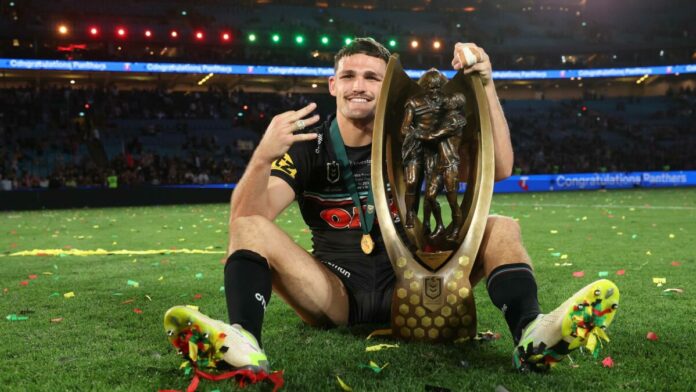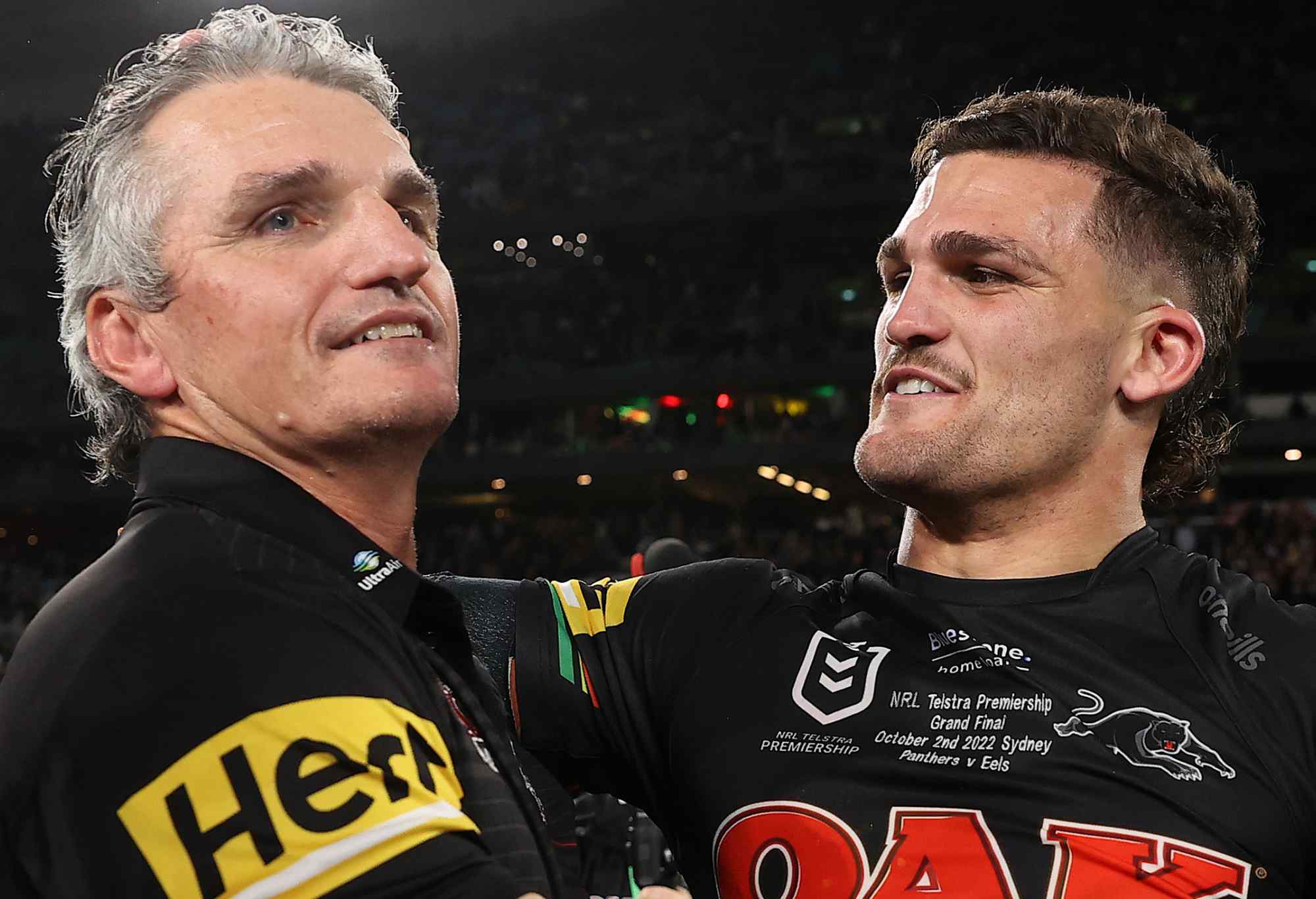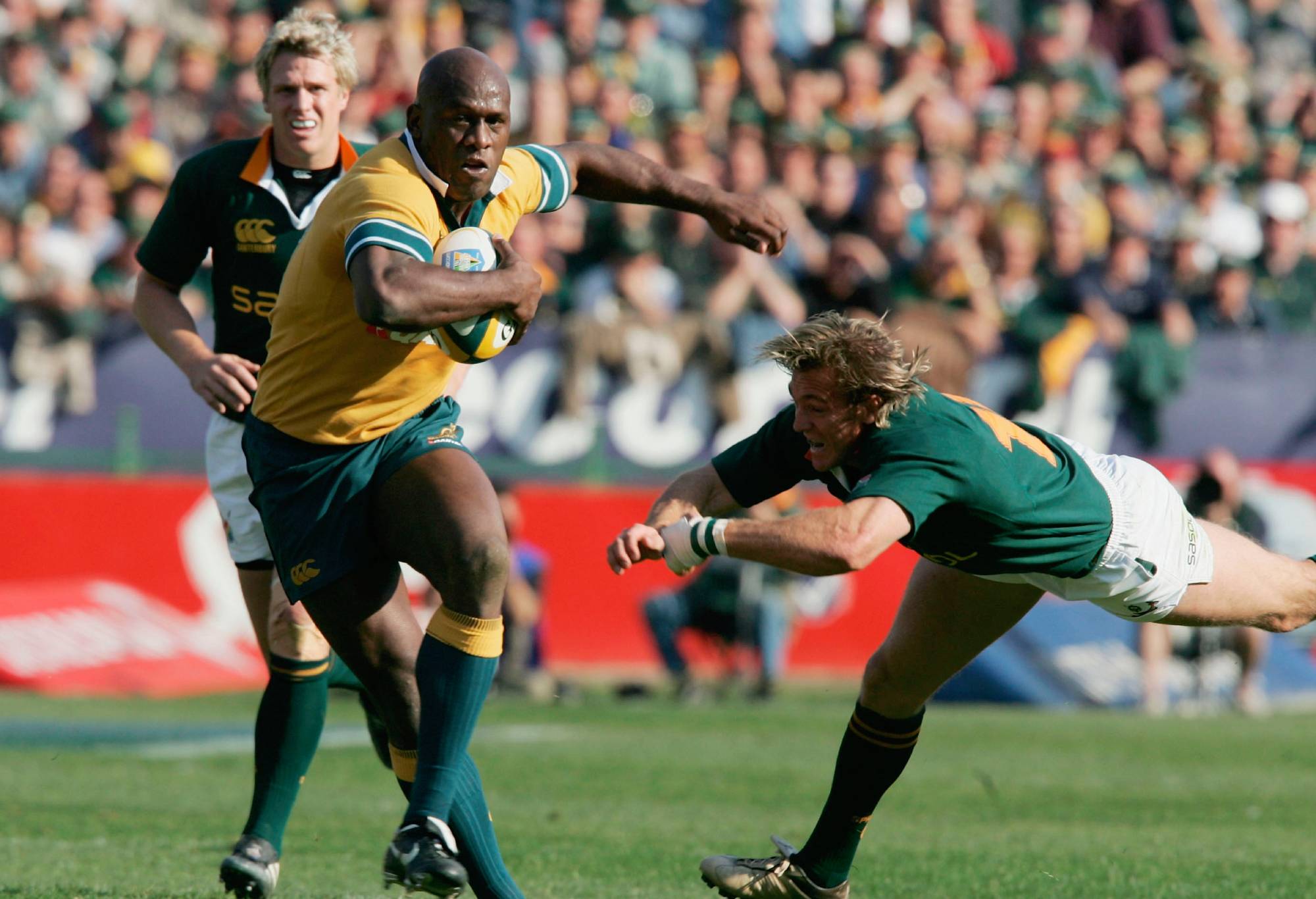
[ad_1]
Hamish McLennan sticking his head up to claim Rugby Australia should mortgage its future on Nathan Cleary does not amount to much in isolation.
He has not been RA chair for more than a year and although he’s naturally entitled to an opinion, his bold statement on its own won’t do much apart from providing grist for the mill in a quiet time of year for both rugby codes in Australia.
But it shows that rugby is still yet to settle on a long-term pathway towards reaching its potential in a country with a crowded sporting landscape.
McLennan’s theory is to go all out for top-level talent like his prized acquisition of Joseph-Aukuso Suaalii, Cleary and any other NRL star who could raise rugby’s profile in the ongoing battle for the hearts, minds and wallets of footy fans in this country.
“I’d be having a crack at the likes of Nathan Cleary and a few others,” he told the Sydney Morning Herald.
“The game needs another five Josephs as the World Cup for ’27 [to be played in Australia] is just around the corner and the clock is ticking … Thank god for Joseph, because that’s all everyone is talking about. Australia is No.10 in the world [rankings] and needs an injection of talent or there will be nothing left to sell.”
League fans, and executives alike, mainly laughed at McLennan during his turbulent time running RA as he shot from the hip in a bid to upset and unsettle the NRL.
His pot shots earned rugby publicity but it’s fair to say his decision making in the boardroom was not exactly a success, highlighted (or should that be lowlighted) by the dumpster fire that was Eddie Jones’ short-lived return as Wallabies coach.
The long-running question of trying to convince Cleary to switch codes will again be debated over the coming days and weeks but it’s likely to be a moot point anyway given the Penrith star has given no indication that he would be interested in walking away from the sport that made him a household name.
He’s already shot down speculation that he could potentially stay in league but take his talents to England where his partner, Matildas star Mary Fowler, spends most of the year with Manchester City.
There is also the not insignificant detail that Cleary has signed a deal with the Panthers for three more years and they have just racked up their fourth straight NRL premiership.
RA needs Cleary to have a Michael Jordan moment.
Basketball’s greatest ever player felt fulfilled with the sport and unfulfilled in general after he led Chicago to three straight NBA championships in the early 1990s.
Jordan chose to try his hand at his childhood dream of becoming a professional baseball player. He did and he failed, so he returned to propel the Bulls to three more titles before retiring with more championship rings than he could wear on one hand.
(Photo by Getty Images)
No team has won four rugby league premierships in Australia since the 1956-66 St George record-breakers.
It’s unlikely Cleary will walk away from the Panthers “anytime soon”, which were his words last week when asked about the Super League speculation, and while ever his team is on this current streak of titles, the chances of him departing would have to be as close to zero as mathematically possible.
Throw in the fact that Penrith’s coach just happens to be his old man, Ivan, and we’re into Lloyd Christmas odds for saying there’s a chance of him becoming a Wallaby.
And it must be remembered that loyalty drives Cleary.
As a young halfback back in 2018 just making his name in the NRL he had a chance to switch clubs to the Wests Tigers when Ivan was at Concord.
But his loyalty to his teammates and the club overrode his desire to have his dad become his coach.
Nathan re-signed with the Panthers, they in turn brokered a deal with Ivan to come back and he told the Tigers he wouldn’t be sticking around in what turned out to be one of the smartest behind-the-scenes manoeuvring by an NRL club in decades.

The fact that Australia will host the men’s Rugby World Cup in 2027 makes this a crucial period for the sport.
RA’s coffers will get a much-needed injection of funds but if their bean-counters are foolish, they will soon be parted from the financial windfall.
Throwing mega deals at Cleary, Suaalii, Cameron Murray (under contract at Souths until 2028) or any other league player will be astronomically expensive.
Rugby’s often antagonistic state and national administrators couldn’t get their act together to sign Roosters star Angus Crichton even though he was open to the idea of returning to the 15-player code.
If they couldn’t seal that deal (at a time when McLennan was pulling the strings), how do you expect them to piece together an offer for Cleary or less willing NRL stars without bringing RA to financial ruin.
Kerry Packer famously said, “you only get one Alan Bond in your lifetime and I’ve had mine” when asked about the jackpot he struck when he sold Channel Nine to his corrupt counterpart for an inflated price, before later buying it back three years later at a quarter of the cost.
With as much as $100 million flowing back into the RA bank account from the World Cup hosting rights later this decade, this is the sport’s Alan Bond moment.
Traditionalists will argue that rugby needs to invest in the neglected grassroots of the game in Australia for the code to have sustainable success.
While the gamblers who believe in McLennan’s viewpoint can see only a slow demise if rugby continues down its current path so they might as well roll the dice on some big-name recruits.

When rugby was last a genuine rival to league and the AFL more than 15 years ago, high-profile talent from the NRL was part of the appeal but the success of the Wallabies and Super Rugby was built on players who had only ever aspired to play on that stage.
Mat Rogers, Wendell Sailor, Lote Tuqiri and co played their part on the field as attacking threats and off the field by generating publicity but rugby’s true stars in John Eales, Stephen Larkham, George Smith, Stirling Mortlock and George Gregan did not become champion players by accident.
They were products of a system which developed elite players and bred loyalty.
Phil Waugh was another of those players and now that he is CEO of Rugby Australia, it’s his opinion that counts, not McLennan’s.
Rugby’s only chance of truly rivalling league in Australia again is not by poaching its stars but producing its own.
[ad_2]
Copyright for syndicated content belongs to the linked Source link

